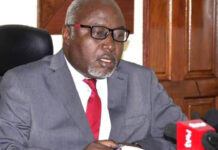The Labour Relations Court has refused to throw out a plea by Capital Markets Authority (CMA) James Ndegwa, in which he wanted a case challenging his re-election thrown out. – By John Mutiso.
In 2020, activist Okiya Omtatah filed a petition seeking the disbandment of the Capital Markets Authority (CMA) board where he accused its chairman James Ndegwa and other six board members of conflict of interest.
The six board members include John Birech, Freshia Mugo, George Moibi, Thomas Kibua, Christine Okoth and Peter Mungai.
Omtatah accused president Uhuru Kenyatta and the Treasury Secretary of handpicking the board members without subjecting them into a transparent, competitive and merit-based process.
In the petition filed by Omtatah, Ndegwa was accused of being a player in a market that he regulates, which amounts to a conflict of interest to the “extent that he is a public official who regulates his private businesses”.
Mr Omtatah wants the court to declare “that the decision to handpick and appoint the chairperson and the independent members of the CMA board contrary to the law which requires that public office be filled through a transparent, competitive and merit-based recruitment process open to public participation was irregular, unlawful and unconstitutional.”
Ndegwa and the board members argued that the case was not properly placed in the court, since the court lacks requisite powers to hear and determine the petition.They argued that there is no employer-employee relationship between them and the appointing authority (President Uhuru Kenyatta and the Cabinet Secretary for the National Treasury and Planning).
Justice Maureen Onyango, however, threw out the plea, directing that the case proceeds to a full hearing. According to Justice Onyango, the matter concerns recruitment to a position that is remunerable and that would fall under the definition of an employee under Section 2 of the Employment Act.

She cited earlier judgment where the court held that a dispute that concerns employment in the public sector like chairperson and members of the boards of other State corporations or boards of other public bodies, are public offices bound by applicable constitutional and statutory provisions, as well as lawful policies and practises that govern public employment.


















